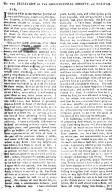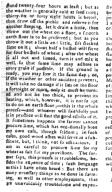[ Preparing Seed Wheat, to Prevent the Crop from being Smutty ] James Clarke
Date: 1790/05/02
Source:
Nova Scotia Magazine
Institution: Nova Scotia Archives
| Source Origin: Nova Scotia Newspapers on Microfilm
| Reference: Microfilm Reels 8062, 8063
Instructions on how to prevent smut in wheat by treating the seed with a pickling solution and lime or ash published by the Secretary of the Agriculture Society in Halifax. nn.372_73. Microfilm Reel 8062.
TO THE SECRETARY OF THE AGRICULTURAL SOCIETY, AT HALIFAX
SIR,
I OBSERVED in the Halifax Journal, of
the 11th February, taken from the Que-
bec Gazette, observations on that most
dangerous disease in wheat, called the
smut; and as I cannot agree with the au-
thor of that piece respecting the cause of
that disease, I have taken the liberty, not
so much to ascertain the cause, as to
point out the remedy for that pernicious
malady.
The author justly observes, that there
are two sorts of smut; one he calls rusty
smut, which is the worst; the other dusty
smut; the last is common amongst bar-
ley, oats and rye, as well as wheat; but
it does no material injury to the crop: I
suppose it proceeds from some defect in
the seed. As to the rusty smut, it is a ve-
ry pernicious disease and very prevalent in
Nova-Scotia: the grains that remain
whole after threshing, a very few, will
cast, a deep shade on a considerable quanti-
ty of good flour, and render it disagreeable
in smell and taste. The only way to pre
vent their bad effect is, to wash the wheat
in clean water, skim of all the smut and
other foulness, and then dry it in the sun
or on a kiln; after which it will make as
good flour as any clean wheat. I
cannot pretend to investigate the cause of
the rusty smut, but believe it proceeds
from a defect in some of the light under
lain seed corn, and not from mists, or the
various intemperatures of the air or kinds
of land it is sown on, or contagion from
the dirt of smut adhering to the seed or
manures, as the aforementioned author
observes. I have constantly followed the
business of farming in Nova-Scotia twen-
ty-eight years, and generally sowed from
20 to 30 bushels of wheat annually, and
have experienced on all sorts of land in
the part of the province where I reside,
and never observed one smutty grain of
wheat in my fields: but my neighbours
are seldom free from it, more or less. I
have endeavoured to inculcate the means
to prevent the smut amongst them; some
few have adopted the means with good ef-
fect; others, the greatest number, partially
or not at all; so that very little wheat is
to be had but what is more or less smutty.
I agree with that author, that the farmer
ought to be very careful to procure good
seed: a bright heavy full grain, free from
all sorts of mixture, and to change his seed
often, (it would be best to do it every
year); this change of seed should be pro-
cured from a considerable distance, and
from a different soil. I have often had
___
pease, barley, oats, and other spring grain
from England, and always found a rapid
growth and great increase, the first year
especially. I have been obliged to sow
wheat that was smutty (not of my own
raising) when no other could be had, and
the seed I had reserved would not hold out
for the land I had prepared, and have had
good crops without smut. I have often
supplied my neighbours with seed wheat,
from the same heap I took my own from
--theirs have been smutty, and mine not.
One instance in particular I will mention:
Some years past, a tenant of mine came in
the spring and desired me to let him have
some seed wheat, the wheat he had, being
foul and smutty. I let him have what he
wanted, and advised him in what manner
to prepare it before he sowed it: he was an
elderly man, and answered, he knew very
well how to raise wheat before he came to
this province. I told him, notwithstand-
ing all his knowledge, if he did not pre-
pare his seed as I advised him, his wheat
would most probably be smutty. He took
his wheat from the same heap that I sowed
mine from; and in the fall, as he did not
return the seed, I called on him for it;
when he said, he was ashamed to bring it,
for his wheat was nearly one half smut,
and that he was convinced some prepara-
tion was necessary to prevent it; and he
was more convinced of this when he saw
my wheat entirely free from smut. These
instances prove to me that the cause of
the smut in the seed may be destroyed.
The following method I practice
of preparing seed wheat, to prevent the
crop from being smutty:--Take a tub that
will hold as much as you intend to steep
at once, put in a tap wisp of straw in the
same manner you do a leech tub; set it
up where you can conveniently draw off
the liquor you intend to put into it; fill
the leech-tub about half full, with a good
pickle: I generally use the pickle my beef,
pork, or fish has been cured in: If it is
foul or not strong enough, boil it and skim
it clean, and add more salt to it; there is
no danger of making it too strong. When
the pickle is prepared, put in the wheat
very slowly out of a half bushel or pail, in
the same manner at when it is winnowed,
to prevent any quantity of the heavy grain
falling in together that might carry down
oats, or any light stuff with it, all which I
skim off; when the tub is so full that the
pickle stands about two inches above the
wheat, stir it well about with a stick, and
skim off every thing that swims; let it
[page break]
stand twenty-four hours at least; but as
the weather is generally cold at feed time;
thirty-six or forty eight hours is better,
then draw off the pickle and reserve it for
another steeping, let it drain a little, then
throw out the wheat on a floor, a smooth
earth floor is to be preferred; but as you
throw it out a little and little, sift slacked
lime on it; about half a bushel will serve
for four bushels of wheat; after the wheat
is all out and limed, turn it and mix it
well, so that some lime may adhere to
every grain if possible. If the ground is
ready, you may sow it the same day; or,
if the weather or other accident prevents,
it will take no damage if it lies on the floor
a fortnight or more, only it must be turn-
ed and not lie too thick, to prevent its
heating, which, however, it is not so apt
to do on an earth floor; --this is the whole
process--and whoever will faithfully put
it in practice will find the good effects of it.
It sometimes happens the farmer cannot
procure lime, which has occasionally been
my own case, though seldom; in such
cases, good wood ashes will serve as a sub-
stitute, but, I think, not so efficacious. I
am as careful to procure lime for my
wheat as salt for my provisions. The far-
mer says, this process is troublesome, be-
sides the expence of time; such language
as this I have often heard: But there are
many necessary things to be done in farm-
ing, as well as other employments, that
are unavoidably troublesome and expen-
___
sive, which, nevertheless, must be done;
besides in this case, the trouble and ex-
pence will be amply repaid in the crop.--
I am fully persuaded this preparation not
only cures or prevents the smut, but gives
a strong vegetation to the first sprout of
the grain, which serves as the manure and
betters the crop. The lime made use of
should be slacked by the wind by long
standing in an open cask in an airy place;
but if stone lime is used, it should be slack-
ed leisurely by sprinkling hot water on it
a little at a time, so that it may be a dry
powder before it is sifted on the wheat.
Many farmers in England dissolve a pound
of green copperas in the pickle before they
put in the wheat, and others dissolve stone
lime in it, to make it more powerful; but
this I never experienced. The smut in
wheat used formerly to be as prevalent in
England, as elsewhere, if used without
preparartion, though very few omit it now.
My present purpose being only to cor-
rect the error respecting the cause and cure
of the smut in the wheat, I shall not at
present say any thing on other grain or the
cultivation of land, &c. which may be a
future consideration.
If the society for promoting agriculture,
think these remarks worth notice, they
will make the proper use of them.
I am, Sir, your Humble Servant,
A FARMER.
Published by Order of the Society,
JAMES CLARKE, Sec’ry
Download: Transcription | Images

